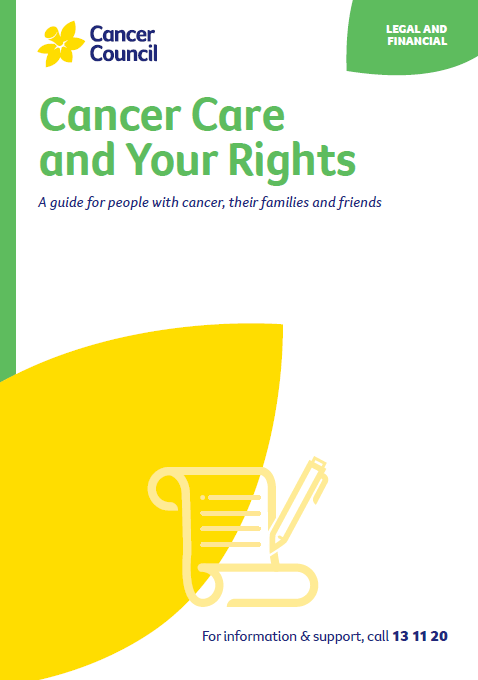- Home
- About Cancer
- Coping with a diagnosis
- Cancer care and your rights
- Health care complaints
- How to give feedback or complain
How to give feedback or complain
All health care facilities should have procedures for patients to provide feedback and complaints.
Learn more about:
Overview
Check with the cancer care coordinator, nursing unit manager or social worker. Some hospitals have a patient representative or patient advocate who looks after patient concerns. You can usually find their details on the hospital’s website.
Raising the issue may mean you get a different view of why something occurred, and talking about it may make you feel better. You can also ask a friend or relative to raise an issue on your behalf.
If you have a problem with a particular person, it is often best to talk to them face-to-face or on the phone. This may help to resolve the issue quickly. If you find it difficult to raise the issue directly, or your initial discussions were not satisfactory, you may prefer to send an email or write a letter. Remember that putting feedback in writing means you will have to wait for a response. Health professionals are bound by a strict code of conduct to maintain confidentiality about any complaints you lodge.
If you have concerns about your health fund and have been unable to resolve these issues with the fund, the Commonwealth Ombudsman looks after private health insurance complaints and may be able to help.
If you feel unable to provide feedback or complain immediately, you can still raise your concerns at a later date. Keep in mind that organisations may not assess complaints after a certain amount of time has elapsed since the event, and there are strict time limits for medical negligence complaints.
Steps for resolving a health care issue
1 | Identify the problem and what you would like to happen to resolve it. |
2 | Talk to your specialist, a nurse or other health professional so they have the chance to resolve the issue immediately. A quick conversation may help to sort out a simple misunderstanding. |
3 | If your complaint is about a particular person and you don’t want to talk to them directly – or you have spoken to them and the issue remains unresolved – speak to the cancer care coordinator, nursing unit manager or social worker at your hospital or treatment centre. |
4 | If you’re not happy with the response from a health professional, or if you want to talk to someone neutral, contact the hospital’s independent patient representative, complaints officer or patient advocate. |
5 | If you’re not satisfied with the patient representative’s investigation, contact the hospital’s quality assurance department or the clinical governance unit of your public hospital. Smaller or private hospitals may not have a patient representative, but you can contact the nursing unit manager or general manager. |
6 | If you’re still not happy with the outcome – or you don’t want to raise the issue with the health care facility – contact your state or territory health complaints organisation or the Australian Health Practitioner Regulation Agency. If you have a serious complaint that you want to take to a health complaints organisation, you may wish to obtain independent legal advice. |
→ READ MORE: Making a formal health care complaint
Podcast: Coping with a cancer diagnosis
Listen to more of our podcast for people affected by cancer
More resources
Prof Sarah Lewis, Faculty of Medicine and Health, The University of Sydney, NSW; Kevin Bloom, Senior Social Worker, Haematology and Bone Marrow Transplant, Royal North Shore Hospital, NSW; Danielle Curnoe, Consumer; Alana Fitzgibbon, Clinical Nurse Consultant – Gastro-Intestinal Cancers, Cancer Services, Royal Hobart Hospital, TAS; Hall & Wilcox (law firm); Johanna Jordaan, Consumer; Dr Deme Karikios, Medical Oncologist, Nepean Cancer and Wellness Centre, Nepean Hospital, NSW; Melissa Lawrie, Breast Cancer Clinical Nurse, Cancer Services, Gold Coast Hospital and Health Service, QLD; Jacqueline Lesage, Consumer Reviewer, Cancer Voices NSW; McCabe Centre for Law and Cancer, VIC; Louise Pellerade, 13 11 20 Consultant, Cancer Council WA; Andrew Potter, Consumer; Siân Slade, PhD Candidate, Nossal Institute for Global Health and Non-Executive Director (health, disability sectors), VIC; Paula Watt, Clinical Psychologist, WOMEN Centre, WA.
View the Cancer Council NSW editorial policy.
View all publications or call 13 11 20 for free printed copies.
Need to talk?
Support services
Need legal and financial assistance?
Pro bono services, financial and legal assistance, and no interest loans
Looking for transport, accommodation or home help?
Practical advice and support during and after treatment
Cancer information
Dealing with the diagnosis
Common reactions to a cancer diagnosis and how to find hope
Resource hub
Guides, fact sheets, videos, podcasts and more for people with cancer, their families and friends

